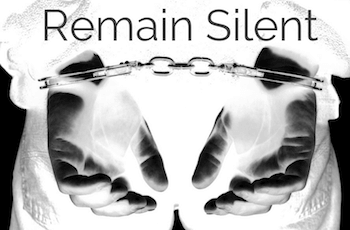Miranda Rights in Texas
Do police have to read you your rights?

“You have the right to remain silent. Anything you say can and will be used against you. You have the right to speak to an attorney and to have an attorney present during any questioning.” These are words everyone has heard hundreds of times on TV and in the movies, but what do they mean in real life if you are accused of a crime?
Miranda v. Arizona is a landmark Supreme Court case from 1966 that requires a formal warning, such as the one above, be given to anyone prior to a custodial interrogation. It is necessary that the person be warned of the right to counsel as well as the right to remain silent. The state of Texas has codified this rule in Articles 38.21 and 38.22 of the Texas Code of Criminal Procedure. If this “rule” is violated, the government cannot use any statements against the accused. If you are accused of a crime or suspect that you are under investigation for a crime, it is important that you ensure your rights have not been violated by discussing your case with a skilled Fort Worth criminal defense lawyer.
When can a statement be used in a criminal case?
“Miranda” only applies to statements made as a result of custodial interrogation. “Custodial Interrogation” generally means a person is under arrest and the police are asking the person questions to further the investigation of the crime for which the person is arrested. The State of Texas can use these statements against an accused only if the State can show that the person received a warning containing the following information:
- the right to remain silent and not make any statement at all and that any statement made can be used against him at trial;
- any statement he makes may be used as evidence against him in court;
- he has the right to have a lawyer present to advise him prior to and during questioning;
- if he is unable to employ a lawyer, he has the right to have a lawyer appointed to advise him prior to and during any questioning; and
- he has the right to terminate the interview at any time.
Additionally, the State must show that the accused knowingly, intelligently, and voluntarily waived the rights set out above. Usually, this is not hard to prove, and in reality the person accused must present evidence to convince a judge the statements were not given freely and voluntarily. Any custodial interrogation must be recorded by electronic means before the State can use the statement against the accused.
What if the police don’t read me my Miranda rights?
The simplest answer is that they do not always have to. If you voluntarily go down to the police station to talk to the police, they are not required to read your Miranda warning and may still use the statement against you. This is a tactic that police will often employ when conducting an investigation. Police may tell you that they have some questions for you to “help clear your name” and make it seem as though the questions are in your best interest. If you voluntarily go to the police station, you are not considered “in custody” for purposes of Miranda and they do not have to give you the warning. This is a very tricky area of law and should be discussed with a Fort Worth criminal defense lawyer to ensure that your rights are not violated.

What if I am arrested and the police did not read me my Miranda rights?
Be very careful if you are ever in the presence of police officers because it is likely that there is some type of recording device capturing your statements and behavior. Once you are placed under arrest, the police are not required to read you the Miranda warning. This is a common misconception. People often believe that their rights have been violated if they have been arrested and were not immediately read their “rights”, but this is not always the case. If you are placed under arrest, police will rarely read you your Miranda rights at the moment of arrest. Many people will ask “does that mean that they can’t use my statements against me?” The easy answer is no, that is not what that means. If you make statements that are voluntary and not in response to any questions, those statements can be used against you even if you are never warned of your rights under Miranda. Miranda only applies if you are being asked questions while in the custody of police.
What if my Miranda rights were violated?
If your 5th or 6th Amendment rights were violated by police, you are entitled to have your statements to the police suppressed. If your statements to the police are suppressed, they cannot be used against you in a prosecution.
How do I get my statement to police thrown out or suppressed?

An experienced Fort Worth criminal defense lawyer will need to file a motion to suppress your statement. The trial court will then hear the motion and the judge will examine the issue of law as to whether your rights were violated. During the hearing, your defense lawyer will call police officers as witnesses to show that your rights were violated and the judge will make a determination as to any such violation. If the judge agrees that your rights were violated, then your statement is thrown out or suppressed and cannot be used against you at your trial or in your case.
In some instances, a case will be so weak that the State will be forced to dismiss your case when your statement cannot be used or will cause the State to offer you a better plea bargain. Even if you don’t think your rights have been violated, an attorney should still review your case in its entirety because this is an ever-changing area of law and a skilled lawyer may find a violation you did not know existed. Our lead trial attorney, Cody Cofer, is Board Certified in Criminal Law. He stays abreast of the latest developments in Fifth and Sixth Amendment law related to custodial interrogations. We regularly litigate issues related to statements illegally obtained by police.
The purpose behind the Miranda warning is to prevent people from being coerced into giving statements to the police. The line of cases concerning the Miranda warning has evolved and every few years the Supreme Court will address a new issue concerning Miranda. Since this is an ever-changing area of law, it is critical that an experienced Fort Worth criminal defense attorney is retained to fight for your rights.